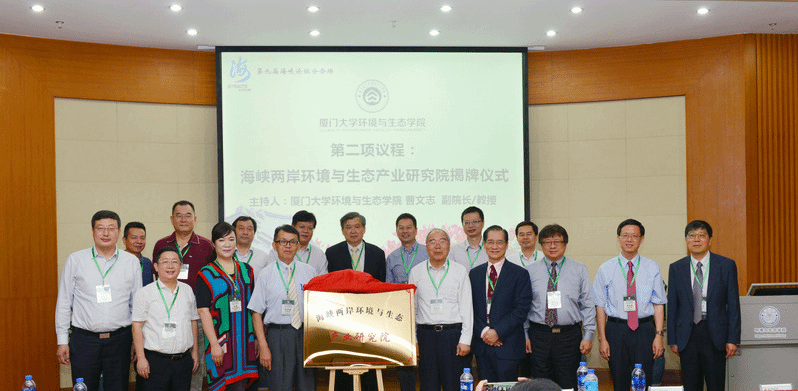
On July 17, the 2017 Cross-strait Ecology & Environment Seminar was successfully convened at Xiamen University. The event was jointly organized by XMU, a couple of higher education institutions including National Taiwan University as well as the Cross-strait Research Institute for Ecology & Environment Industry. As a sub-forum of the 9th Straits Forum & Technology Experts Forum, this seminar consisted of three parts, i.e., invitation report, academic sub-forum and sub-forum for the government, businesses, schools and research institutes. The organizers invited over 120 experts and scholars from some prestigious universities and research institutes across the Straits, together with representatives from the government and companies.
The opening ceremony was held at the College of Environment and Ecology on the morning of June 17, which witnessed the signing ceremony of new counterparts joining the Association for Cross-strait Environment and Ecology (hereinafter the Association) and the unveiling ceremony of the Cross-strait Research Institute for Ecology & Environment Industry (hereinafter the Institute)
The Association was set up on July, 2016, which was a joint initiative by Xiamen University and Taiwan University. It serves as a multi/interdisciplinary platform for academic exchanges in the field of ecology and environment. It’s reported that the second seminar of the Association is expected to be convened between August 5 to August 11 at National Taiwan University. From now on, all parties from the Association are supposed to make joint efforts to promote partnership among the cross-strait colleges and universities, research institutes and companies, take the lead in innovation and coordinated developments, and do their part for the cause of the cross-Strait environmental and ecological protection.
Following the opening ceremony, four experts including Prof. Hao Jiming, Academician of Chinese Academy of Sciences (CAS), were invited to present their separate reports entitled, respectively, “Technological Innovation on Air pollution Prevention”, “Lessons Learned from US Superfund Programs”, “Management Strategies of Carbon-reduction for Sewage System Life Cycle” and “Tracking Antibiotic Resistance Genes in the Environment”.
The three academic sub-forums were held simultaneously on the afternoon of June 17, in which over 30 experts and scholars from colleges and universities and research institutes delivered multiple presentations covering topics from water environment health and ecological safety, environmental pollution prevention, ecological restoration to the research on ecosystem of coastal wetland and global change, sustainable development and environmental management. Meanwhile, the sub-forum for the government, businesses, schools and research institutes was held at the College of Environment and Ecology of Xiamen University, and the attendees engaged in heated discussions mainly on three topics, namely the introduction to and need of environmental industries, water environment within basin areas and comprehensive management, and the construction of an eco-sponge campus.


Edited by Li Zhiruo, Liu Changsheng, and Du Xueyang